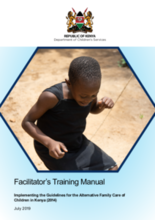This comprehensive training package includes the training facilitator’s manual, PowerPoint presentations, handouts, case studies, and video clips. They provide information, methodologies, and practical tools to build the capacity of child protection practitioners who work directly with or for children at risk of separation from their families or those who are deprived of parental care. Alternative care—as presented in the Guidelines for the Alternative Family Care of Children in Kenya—applies to a formal or informal arrangement whereby a child is looked after at least overnight outside the parental home. In collaboration with Children Officers, this can either be decided by a judicial or administrative authority, such as the Alternative Care Committee (ACC)—a subcommittee of the Area Advisory Committee (AAC)—or at the initiative of the child, his/her parent(s), primary caregivers, or spontaneously by a care provider in the absence of biological parent(s).
The rationale for developing the Facilitators Training Manual
The Government of Kenya (GoK), through the State Department for Social Protection, has embraced the importance of family care given the negative impacts on children’s safety, wellbeing, and development associated with residential care. The journey to care reform in Kenya started with the launch of the Guidelines in 2015. This was an important step in the effort to support longer-term care reform. In addition to the launching of the Guidelines, there have been numerous efforts to ensure that children are returning to families and those at risk are retained and supported within their families/communities (i.e., separation is prevented).
The purpose of the Guidelines is to enhance application of the Kenyan legal framework as it relates to care and protection of children and promote improved practices for children without parental care and those at risk of being separated from their parents. It is with this intent that the Department of Children’s Services (DCS) and its care reform partners within government and civil society developed this Facilitator’s Training Manual for training on implementing the Guidelines with the intent to streamline and standardize alternative family care services in Kenya through standardized training. This Facilitator’s Training Manual aims to support the implementation and dissemination of the Guidelines in a standardized way across government actors, service providers, and children/families. It is also designed to strengthen the capacity and equip the child protection workforce and other stakeholders in care reform. The Facilitator’s Training Manual does not substitute other national laws or policies related to the healthy and safe support of children transitioning from residential to family-based care. Rather, the Facilitator’s Training Manual is intended to provide direction, suggestions, and concrete ways to deliver the different care options outlined in the Guidelines.
The training package has been developed for the child protection workforce engaged with families, children in need of alternative family care, and children at risk of being separated from their families/communities. The Facilitator’s Training Manual presents different forms of alternative family care and the eligible children to be placed in those alternatives while outlining the placement procedures and approval processes. The Facilitator’s Training Manual is complemented with a participants’ handbook and a series of PowerPoint slides.
Read also the User-friendly Handbook for the Guidelines.

